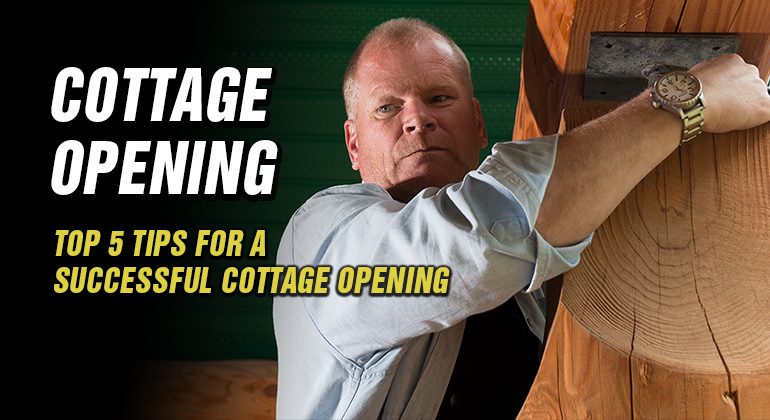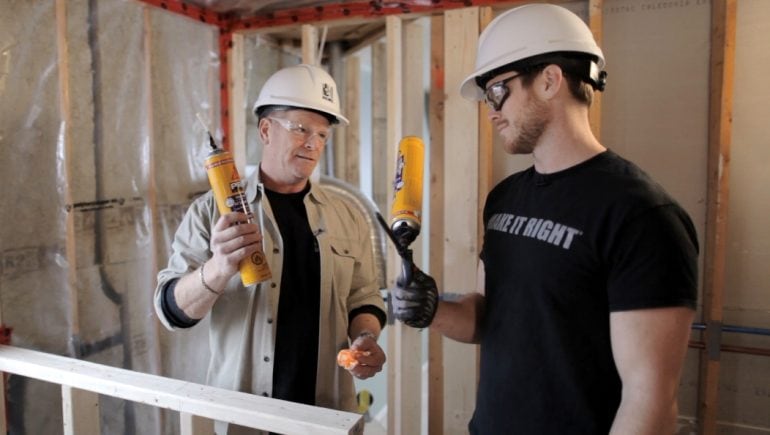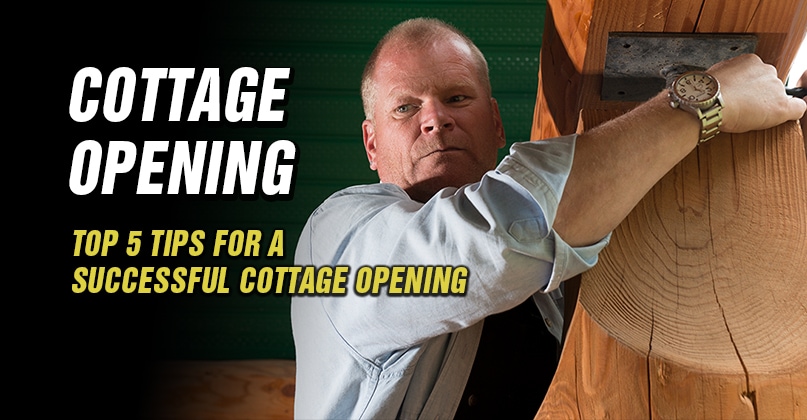When it’s time to replace your HVAC system, you have several options, each with its own benefits. Choosing the right HVAC system depends on your home’s size, climate, energy needs,...

A Complete Cottage Opening Checklist For A Successful Opening
By Mike Holmes
Mike’s Advice / Home Safety & Maintenance
Thursday, May 9th, 2019 @ 10:41am
What Should Be on Your Cottage Opening Checklist for a Successful Opening?
If you are like me, you have been looking forward to getting on your boat, entertaining on your deck, or opening up your cottage for a few months now. Luckily it’s cottage season but before you get your boat out, fire up that grill, there are a few jobs you need to tackle first. Here are my top 5 tips for opening up your cottage the right way.
Clean Your Cottage’s Eavestroughs
If you’ve read my article about 10 tasks for your winter home maintenance checklist you would have been diligent about clearing the eavestrough before every winter. The same goes for your cottage. Debris will start to accumulate and clog those eavestroughs. Get a ladder and SAFELY clean your gutters.
Remember: Always Use the 4:1 rule when using a ladder.
Inspect for Rodents Living in Your Cottage
Most cottage owners have the unpleasant surprise of having unwanted intruders in their summer home. You’ll want to be on the lookout for obvious signs of unwanted entry — things like holes in your soffits, and torn window screens. Animals can even pull away siding and find their way through your roof venting or even your chimney.
Even something as small as a mouse can cause big issues. These small rodents can eat away at the wood in your home or chew through electrical wires. If you notice any of your electrical wires have been chewed up, call your local licensed electrician! An electrician needs to check your electrical system and make sure it’s safe. Remember, electrical work should not be DIY.
After finding signs of unwanted entry you’ll want to remove these unwanted tenants — to do this, it’s best to bring in a professional pest control expert. Because believe me, you want them evicted before they reproduce and cause an infestation. When it comes to finding signs of mice, you’ll want to spray the area where they were located with a disinfectant.
REMEMBER
When you are cleaning up after your unwanted guests, it’s good to keep those dirty particles from floating around, because if you were to breathe in materials from their droppings or saliva can make you sick. And always wear a disposable mask and gloves to reduce the risk of contact.
Check Your Cottage’s Indoor Air Quality
I’m glad to see more and more homeowners paying attention to their indoor air quality and having it tested for mould and radon. You should do the same at your cottage. It’s always important to maintain your indoor air quality in your cottage because it was closed up all winter with very little or no ventilation.
Since you’re now back in the cottage, you’ll need to first start off by opening up the windows. Air it out.
You’ll need your nose for this step. If you notice a strong musty smell, it could mean a moisture problem — and lots of moisture could lead to a mould problem. You need to stop the source of moisture before anything else because if you don’t you’ll be dealing with mold problems again and again. If it’s a small area, you can most likely clean it yourself — just make sure you have proper cleaning equipment and solution (goggles, gloves, and a respirator or mask). But, if the mold area is large, you need to bring in a remediation expert.
Simple Fixes in Your Cottage
Inspect the caulking around your doors and windows. Broken caulking leaves the perfect entryway for water to seep in, and it’s an easy fix.

Use a low-expansion foam like Sika Boom to insulate your windows and doors. Easily available at your local hardware stores. Sika Boom is a Holmes Approved, all-season, one-component, low-expansion polyurethane foam.
Same with the weather stripping around doors – if it’s damaged, it’s simple to fix but when you leave it unrepaired, then you’re giving it access to water penetration.
Replace the batteries in your smoke alarms and carbon monoxide detectors. Change the batteries every 6 months and replace detectors every 10 years. Smoke alarms and carbon monoxide detectors should be installed on every floor of your home.

Make sure to test that the smoke alarms are working when opening your cottage and again when you plan to close your cottage for the season.
Restoring Electricity To Your Cottage Safely
Remember your cottage has been closed for a few months and your electricity has been shut off too. So before you switch everything back on there are a few important things to check first:
- On the way to your cottage, look for any evidence of powerline damage. If you come across fallen or sagging lines, keep a safe distance and immediately inform your local utility company for help.
- Check the proximity of trees to powerlines; are they less than one metre apart? If this is the case, then you must notify your utility company. If you own the hydro poles and powerlines on your property, you should hire a professional to properly cut the trees.
- Pay attention to the transformer on a pole —it looks like a little garbage can. This signifies that it is linked to high-voltage powerline. Make sure to maintain a minimum distance of four metres between any branches and this powerline.
Check For Damage Before Switching On The Main Switch
Before switching on the main, it’s also important to check that there is no damage to any of your wiring.
- Examine the wiring attached to outside equipment, such as water pumps, to make sure it is undamaged and in good working condition. If any damage is found, it is important to remove the proper fuse or switch off the circuit breaker and contact a Licenced Electrical Contractor immediately.
Check that all appliances and electrical gadgets have been disconnected or turned off. Clear any debris that has developed on stovetop elements and baseboard heaters.
Examine every appliance and extension cables thoroughly for signs of damage or wear. Keep an eye out for any signs of rodent damage.
Check your electric furnace’s chimney for any debris, such as bird’s nests or leaves, and make sure it’s clean.
Here’s an illustrated guide to help you have a safe summer at the cottage:
Once you’ve switched on your main, it’s time to check your switches. One flip of your light switch is all you need to do right? Well, it’s actually better for your cottage to take it room by room. Check for flickering lights, a burning smell from appliances, or any sparking fixtures.
Next, you’ll want to switch the water back on. Again do this by going room by room. You’ll want to be looking for any leaks while doing so. And last but not least, test your HVAC system and change the air filter.
READ MORE:
Here are more electrical safety tips when opening your cottage
Inspect Your Cottage Deck
Before having family and friends over — make sure you are checking your deck thoroughly. That means the railings, steps, and ledger board (the piece of the deck that holds the structure to the building), all needs to be safe and secure. Also, check for dry rot or damage caused by insects on your decking material.
BONUS TIP: Renting Ouy Your Cottage? Consider A Smart Lock For Security
If you rent out your cottage, I HIGHLY recommend installing a smart lock. A keyless entry system is great for cottages because you don’t have to physically wait around to hand over the key to someone and you can remotely ensure that they are checking out at the predetermined check-out time. You can also have an access code created for the cleaning staff or anyone else who needs access to the property.

We have a Schlage Smart Lock Installed on all our projects!
You might be only at your cottage for half the year and only on weekends, which might not be much. However, it’s still your home away from home during the summer. Also, keep in mind, that the longer you’re away from your cottage, the more landscape maintenance you’ll need to do. Never slack on your regular maintenance because cottage season goes by so fast — make it right and make it safe.
READ NEXT
Deck Safety Tips
Deck Maintenance Tips
Deck Inspection and How to Check Your Deck Safety
Gas Tankless Water Heaters | What You Should Know










